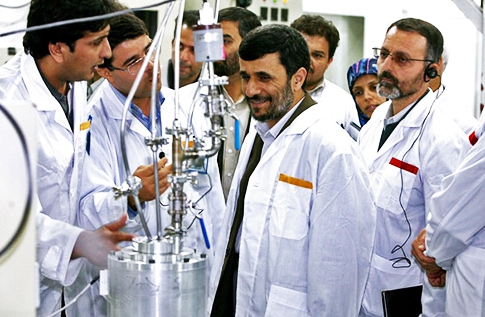
The world economy would bear substantial costs if the United States took steps to significantly escalate the conflict with Iran over its controversial nuclear programme, according to the findings of a Federation of American Scientists� (FAS) special report released here Friday.
Based on consulations with a group of nine bipartisan economic and national security experts,�the findings�showed the effects of U.S. escalatory action against Iran could range from 64 billion to 1.7 trillion dollars in losses for the world economy over the initial three-month term.
The least likely scenario of de-escalation, which would require U.S. unilateral steps showing it was willing to make concessions to resolve the standoff, would result in an estimated global economic benefit of 60 billion dollars.
�The study�s findings suggest that there are potential costs to any number of U.S.-led actions and, in general, the more severe the action, the greater the possible costs,� Mark Jansson, FAS�s special projects director, told IPS.
�That being said, even among experts, there is tremendous uncertainty about what might happen at the higher end of the escalation ladder,� added Jansson, the second author of the report after Charles P. Blair, an FAS senior fellow on state and non-state threats.
The six plausible scenarios of U.S.-led actions against Iran included isolation and a Gulf blockade, which would include U.S. moves to �curtail any exports of refined oil products, natural gas, energy equipment and services�, the banning of the Iranian energy sector worldwide (incurring an estimated global economic cost of 325 billion dollars), and a comprehensive bombing campaign that would also target Iran�s ability to retaliate (incurring an estimated global economic cost of 1.082 trillion dollars).
The report is explicit in not endorsing any particular policy recommendation, although others are not so reticent.
United Against a Nuclear Iran (UANI) and the neoconservative Foundation for Defense of Democracies (FDD) are leading hardline Washington-based advocacy groups arguing for sweeping economic measures against Iran.
�The White House must build on this momentum, intensifying economic warfare in an effort to shake the Islamic Republic to its core,��wrote�FDD executive director Mark Dubowitz in June.
Paul Sullivan, an economics professor specialising in Middle East security at Georgetown University, told IPS that, �The fact that the hardest core of the neoconservative �strategists� have not thought through the costs of escalating conflict with Iran is proof of their group intellectual inadequacy.
�The main effects to the U.S. if there is escalation is through the price of oil and increased military and other national security costs,� said Sullivan, who evaluated the scenarios as an expert but could not comment on the specific figures due to Chatham House Rules.
�If there is an attack on Iran, with the expected counterattacks the price of oil could quite easily go to 250 dollars or higher. This could push the U.S. right back into a recession,� he said.
As tensions rise over the decades-long dispute over Iran�s controversial nuclear programme, analysts are increasingly examining a range of costs associated with escalating the so-far cold conflict between the U.S. and Iran.
The�Iran Project Report�released in September showed that the cost of Iranian retaliation would be �felt over the longer term� by the U.S. and could result in a regional war.
�In addition to the financial costs of conducting military attacks against Iran, which would be significant�there would likely be near-term costs associated with Iranian retaliation, through both direct and surrogate asymmetrical attacks,� according to the report, which was endorsed by a long list of high-level, bipartisan national security advisers.
The Iran Project report�s findings support the notion that greater escalatory action will result in greater costs � shown in financial terms by the FAS findings: �A dynamic of escalation, action, and counteraction could produce serious unintended consequences that would significantly increase all of these costs and lead, potentially, to all-out regional war,� notes the report.
An Oct. 19 event on the economic and military considerations of war with Iran at the Center for the National Interest (CNI) offered similar assessments.
�You could lose eight million barrels a day of production, and it would not come back quickly,� said J. Robinson West, who has also held senior positions in the White House, the Energy Department, and the Pentagon under various Republican administrations. �We believe the price of oil will go above 200 dollars a barrel.�
On Oct. 20, the New York Times reported that the U.S. and Iran had �agreed in principle for the first time� to direct negotiations.
But Tehran and Washington did have �limited bilateral talks� in 2009 �when the Iranian leadership saw a potential in the newly elected Obama administration to address some of Iran�s bottom lines regarding the country�s right to enrichment,� Farideh Farhi, an independent scholar and affiliate graduate faculty at the University of Hawai�i, told IPS.
On Wednesday, President Obama denied the Times report but did not dismiss the notion of one-on-one talks. In fact, he strongly suggested that the U.S. would seriously engage if the Iranians proved their sincerity.
�If Iran is serious about wanting to resolve this, they�ll be in a position to resolve it,� he said during his first press conference following his successful presidential re-election campaign.
�The situation is different now insofar as the Iranian leadership is much more sceptical of Obama�s words regarding his desire to resolve the nuclear issue instead of going for the Islamic regime�s jugular after a show of desire for talks,� said Farhi.
�To be sure, there will always be hardline naysayers in Tehran no matter what. A similar situation exists in the U.S.. But if the past is any guide, Tehran will come around and abandon its current resistance to bilateral talks if it sees a potential for breakthrough,� she said.
The Iran Project is not responsible for the content of quoted articles.











